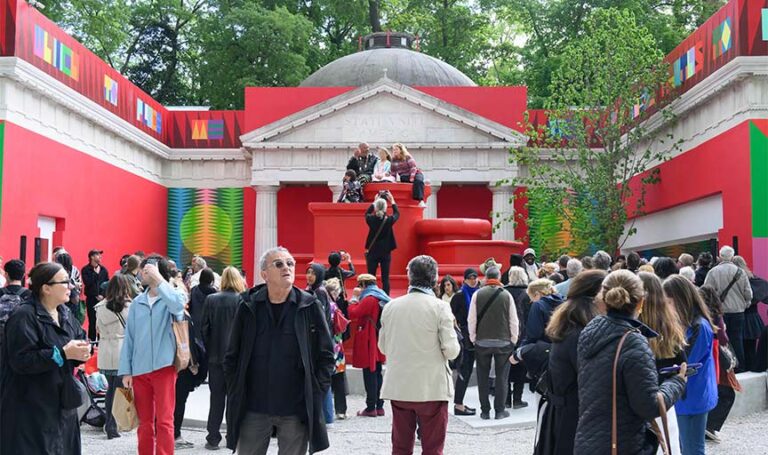60th Venice Biennale proves that art is rarely, if ever, apolitical

The Venice Biennale Arte is the world’s oldest and most prestigious arts festival. Its 60th edition, themed ‘Foreigners Everywhere’, opened last week on 20 April 2024, spreading throughout the Italian city—and it promises to be one of the most politically charged events to date.
This year marks the first Biennale under the administration of Giorgia Meloni, Italy’s most right-wing prime minister since World War II. The Minister of Culture, Gennaro Sangiuliano, appointed Pietrangelo Buttafuoco, a right-wing writer, as the new chairman of the Biennale in October 2023. Buttafuoco now oversees various festivals in the city, including the arts and architecture biennales and the annual film festival.
Despite this, the Biennale firmly opposes nationalist politics. For the first time, the curator of the core exhibition, Adriano Pedrosa, hails from Latin America and is based in the Southern Hemisphere. Pedrosa, the artistic director of the Museu de Arte de São Paulo Assis Chateaubriand, has organised the central exhibition to include dedicated sections for queer artists, outsider artists, and Indigenous artists. This inclusion highlights the festival’s commitment to diverse and global perspectives.
The prestigious Golden Lion for Best National Participation went to Australia this year, celebrating Kamilaroi Bigambul artist Archie Moore’s ‘kith and kin’—marking the first time an Australian has received the top award. Moore’s installation features a vast genealogy mapped in chalk on the pavilion walls, reflecting 65,000 years of Indigenous Australian history.
The overall thematic title (remember, Foreigners Everywhere) is borrowed from the Paris-born and Palermo-based collective Claire Fontaine, intended as a provocation to the rising xenophobia in Italy and across Europe. “In Venice, foreigners are everywhere,” Pedrosa explains. “Yet one may also think of the expression as a motto, a slogan, a call to action, a cry—of excitement, joy or fear: Foreigners Everywhere!”
In 2022, when the central pavilion was predominantly filled with work by women and non-binary artists, the Russian pavilion remained shuttered for the duration of the festival. This decision was made by the curator and artists involved, in protest of the invasion of Ukraine that commenced a couple of months prior to the opening of the Biennale. This year, Russia is lending its pavilion—it is one of 29 countries with permanent pavilions in the Giardini—to Bolivia.
Meanwhile, the artists and curators of the Israeli national pavilion announced that they would not open the exhibition until “a ceasefire and hostage release agreement is reached.” The works had been installed in situ, but at the last minute, media director Ruth Patir, alongside the curators, decided not to open the exhibition to the public.
According to The Guardian, Patir said: “As an artist and educator, I firmly object to cultural boycott, but I have a significant difficulty in presenting a project that speaks about the vulnerability of life in a time of unfathomed disregard for it.” Mira Lapidot and Tamar Margalit, the co-curators, added: “There is no end in sight, only the promise of more pain, loss and devastation. The exhibition is up and the pavilion is waiting to be opened. The art can wait but the women, children and people living through hell cannot.”
An open letter addressed to the organisers of the Biennale has been signed by more than 23,000 artists and creatives, calling that they de-platform the Israeli pavilion. One of the group’s justifications is the ban that was imposed on South Africa during apartheid, between 1968 and 1993. The Art Not Genocide Alliance (ANGA) circulated a petition signed by leading artists and art workers from around the world: “As the art world readies itself to visit the Giardini’s nation-state diorama, we say platforming art representing a state engaged in ongoing atrocities against Palestinians in Gaza is unacceptable. No Genocide Pavilion at the Venice Biennale.”
The group staged a large protest outside the pavilion during the preview week (when the artists involved and international journalists are invited to explore the exhibition) and have also been targeting the German, American, British and Italian pavilions due to these nations’ political and financial support of Israel’s siege of Gaza. The Italian government is very supportive of Israel; Italy is one of the leading suppliers of arms for the Israeli military. The pavilion itself is being guarded by three armed Italian military personnel for the duration of the Biennale, which is open to visitors until November.
Multiple Palestinian artists feature throughout the festival, including Samia Halaby, who was awarded a special mention by the Jury. A so-called collateral exhibition, entitled ‘South West Bank’, explores Palestinian history with art from the region and beyond. Adam Broomberg, one of the artists included in this show, said of the decision to close the Israeli pavilion: “Great chess move. The building should remain closed until the occupation and apartheid ends and all Palestinians are given full right of return.”
Like Eurovision, the Biennale offers nation-states the opportunity to launder their reputation on an international scale through cultural participation. There are large-scale campaigns to boycott Eurovision this year due to the fact that Israel has been allowed to participate in the competition while Russia has been excluded since the invasion of Ukraine in 2022.
As with the Biennale, last-minute cancellations might still prove to be effective and embarrassing at Malmö, which is where the song contest will be held in May. Some argue that these spaces should be open to all and, while not necessarily remaining apolitical, should be bipartisan. Meanwhile, others suggest that such boycotts should be on principle. In this respect, some feel that Israel’s decision at the Biennale is the wrong course of action: it should be excluded on principle and uninvited from subsequent iterations.
Art is rarely, if ever, apolitical. International art fairs should take critical perspectives on global politics and reflect the pressing issues of the time. The hope is that the art engages productively and incisively with these ideas and that the politics doesn’t suffocate the art.




